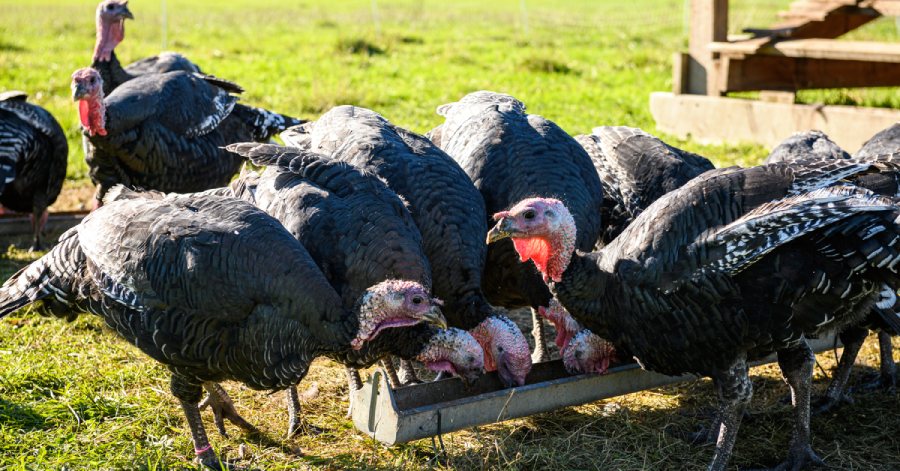If you’ve been thinking about diversifying your egg collection with something unique, turkey eggs might be the perfect addition to your flock.
Not only are they a delicious and nutritious treat, but raising turkeys for eggs can offer a whole new experience for hobby farmers and families.
Here’s everything you need to know before adding laying turkeys to your backyard.
What Are Turkey Eggs?
Turkey eggs are larger than chicken eggs, with a speckled shell that ranges from off-white to a creamy beige color.
Their distinct appearance makes them an interesting addition to your egg basket, and they’re slightly larger than chicken eggs, making them great for baking and gourmet cooking.
Turkey Eggs vs. Chicken Eggs
| Egg Type | Size | Color |
| Turkey Egg | Large (up to 2x the size of a chicken egg) | Off-white to cream with speckles |
| Chicken Egg | Medium to large | Varies by breed |
| Duck Egg | Large | White to light blue |
Turkey eggs are ideal for those interested in more diverse egg types, whether you’re a hobby farmer or a family looking to enjoy farm-fresh eggs with a larger gourmet twist.
It’s likely you won’t find turkey eggs in grocery stores as they lay less often and take longer to reach laying age.
Can You Eat Turkey Eggs?
Yes, turkey eggs are edible and delicious! When collecting and washing turkey eggs, it’s important to handle them carefully to ensure they stay fresh and clean. Store them in the fridge after washing and remember to cook the yolks fully to avoid any potential food safety issues.
Turkey eggs make a great addition to your diet, especially if you’re already raising turkeys. They’re a rich source of flavor, and their size makes them ideal for recipes that call for larger eggs.
Why Don’t We See Turkey Eggs in Stores?
One of the main reasons turkey eggs aren’t commonly found in stores is that turkeys simply lay far fewer eggs than chickens. A typical turkey will lay about 2–3 eggs per week, which is a significant difference compared to the 4–7 eggs per week that chickens usually produce.
Farmers often reserve turkey eggs for hatching poults (baby turkeys), rather than selling them for consumption.
Additionally, turkeys are mainly raised for meat rather than eggs, and the cost of raising turkeys—especially considering their lower egg yield and higher feed-to-egg ratio—makes it less economically viable for large-scale commercial egg production.
So, while turkey eggs aren’t commonly available at grocery stores or co-ops, they’re a special treat for those who raise turkeys at home.
What Do Turkey Eggs Taste Like?
Turkey eggs are known for their richer and creamier taste compared to chicken eggs, making them a gourmet option for those looking to enhance their culinary creations.
The large yolk gives them a more intense flavor, which is perfect for baking, making custards, or preparing a decadent Sunday brunch.
When substituting with turkey eggs it might be necessary to adjust the number of eggs used due to turkey eggs larger volume.
Easy Ways to Enjoy Turkey Eggs
- Scrambled with a dash of salt and pepper
- Hard-boiled with a zing of seasoning for a rich snack
- Baked into pastries, frittatas, or quiches
The flavor is fuller, and the texture is noticeably richer—perfect for any recipe that calls for eggs.
Kitchen Tip: Turkey eggs have tougher shells, so tap them firmly when cracking. They require a bit more effort to open than chicken eggs!
Are Turkey Eggs More Nutritious?
Turkey eggs pack a more nutrient-dense punch than chicken eggs. They are higher in fat, cholesterol, and calories, making them a richer source of energy.
Additionally, they contain more protein, vitamin A, and vitamin B12 than their chicken counterparts.
Turkey vs. Chicken Egg Nutritional Comparison
| Nutrient | Turkey Egg (per egg) | Chicken Egg (per egg) |
| Protein | 10g | 6g |
| Vitamin A | 120 IU | 75 IU |
| B12 | 1.2 mcg | 0.6 mcg |
| Fat | 7g | 5g |
| Calories | 150 | 70 |
If you’re looking to naturally boost your nutrient intake, turkey eggs are a great option, especially if they’re pasture-raised, which may increase their omega-3 content.
For more detailed nutritional information, you can check the USDA nutritional database.
Where to Get Turkey Eggs
If you’re considering adding turkey eggs to your collection, raising heritage turkeys at home is the easiest option. You can also find turkey eggs in farmer’s markets or local regenerative farms, especially during the spring season when egg-laying is at its peak.
Additionally, some online farms and hatcheries sell turkey eggs seasonally. Joining your local farm stand Facebook groups is a great local sourcing option as well.
A few places to check:
- Local farmer’s markets (search for “turkey eggs near me”)
- Online hatcheries or farms that specialize in heritage breeds
- Search for your local options
Keep in mind that turkey eggs are rare, and the price typically ranges from $2 to $3 per egg due to their rarity and the cost of raising turkeys.
How to Raise Turkeys for Eggs
Here are some quick tips for turkey coop care and nesting habits:
1. Provide ample space
- Turkeys need more room to roam compared to chickens. They need a minimum of 16 sq ft per bird for living space. They also prefer to roast much higher than chickens in their coop and outside.
2. Install higher fencing
- Turkeys can fly and need higher fencing to stay contained.
3. Create comfortable nesting areas
- Provide clean, dry areas for them to lay their eggs. They’ll need larger nesting boxes than chickens or ducks.
4. Ensure a balanced diet
- Feed your turkeys high-quality feed suited for their needs.
5. Manage health and wellness
- Regularly monitor their health to avoid common issues. Overcrowding your turkeys can lead to fighting in the flock and a quicker spread of illness and disease. Ample space is an integral part of flock health.
Recommended breeds for laying turkey eggs include:
- Midget White
- Royal Palm
- Narragansett
Turkeys can also coexist with chickens in a mixed flock, but it’s important to keep their dietary and potential illness needs in mind.
Chickens can be a silent carrier of blackhead disease, which can be fatal to turkeys.
They require a different formulation of feed than chickens and would need to be fed separately.
Turkey Eggs vs Chicken Eggs: Which Are Better for Your Flock?
When deciding whether to add turkeys for eggs to your flock, it helps to weigh the pros and cons.
Turkey Egg Pros:
- Unique flavor and texture
- More yolk density (great for baking)
- A gourmet treat
- A different nutritional makeup than chicken eggs
Chicken Egg Pros:
- Reliable, everyday egg source
- More frequent laying (4–7 eggs per week)
- Easier to manage and care for
- Smaller space needs
- More likely to be allowed inside city limits by city ordinances
- Regularly used in recipes with no size conversions necessary
Turkey eggs are a great choice if you’re looking for flavor variety or to add something unique to your flock, while chicken eggs remain the go-to option for consistent egg production.
Are Turkey Eggs Worth Trying?
If you’re seeking a special addition to your culinary taste, turkey eggs are definitely worth trying. Consider finding a local source and trying them out first before diving into adding turkeys to your property.
Explore local farms and give turkey eggs a try. You might just find your new favorite egg!






